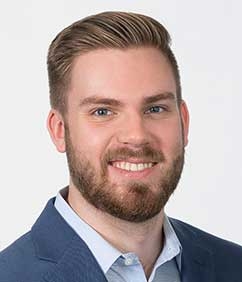Student Spotlight: Austin Upshaw ’25
You won best oralist, best respondent's brief, and first place overall at the 2024 William B. Spong, Jr. Moot Court Tournament. Tell us about your preparation for the moot court tournament.
Preparing for a moot court competition takes place in phases. First, my team and I had to wrap our heads around the case problem. We researched applicable precedents and made strategic decisions about how best to form a persuasive argument based on them. Lots of considerations went into that process. We needed our argument to not only reflect the legal doctrine accurately, but also give the court strong common sense–based reasons to side with the result we were seeking. Then we wrote the brief, which is a piece of writing that lays out our argument in full. Finally, we shifted our focus to the main event for any moot court competition: preparing to do appellate-style oral advocacy. That means standing in front of a panel of judges determined to poke every hole in your argument they can by peppering you with the toughest questions they can think of. We held ten practice sessions leading up to the competition where our student peers acted as judges on panels. It was interesting to see how each judge picked out different aspects of our argument to seize on and question us about, showing how unpredictable an exercise like this can be.
By the time the tournament rolled around, we felt ready to go, and the preparation paid off. Getting to spar over the details of our argument with attorneys and judges who knew the issues deeply was very rewarding. I was honored to have won first place, Best Oralist, and Best Respondent’s Brief alongside my teammate, Megan Haddad, and with the help of our coach, Lucy Sundelson!
What inspired you to pursue a career in law? Any specific career aspirations?
I want to be a trial lawyer and appellate advocate. I had the mock trial bug in college and carried that into law school by joining the Moot Court Board here. But before law school, I did not have a clear sense of what a litigator does day in and day out. What are the decisions they have to make in the earlier stages of litigation, and what sorts of skills best serve them in delivering for their client before a trial or an appeal? I got some answers to those questions this semester. Through an NYU Law program, I was able to join the US Attorney’s Office for the Southern District of New York as a litigation intern in their Civil Division. The experience has shown me so many ways a litigator thinks strategically and moves the ball forward for their client before the matter ends up in a courtroom. While I hope I will have lots of opportunities in my career to do trial and appellate advocacy, my time in law school has shown me so much more of what a litigator does, and made me eager to get to work honing other advocacy skills too. I am excited to join Selendy Gay PLLC, a litigation-only firm in New York City, to do that this summer.
What has been your favorite law school class so far?
In Fall of 2023 I took NYU Law’s Colloquium on Constitutional Theory, and it was unlike any course I had ever taken. Each week we would read an unreleased piece by a legal scholar—either a paper they were working on or a draft of a chapter from an upcoming book. And then that scholar would join our class for a two-hour workshop, where the floor would be open for us to ask questions about their work and dive deep into their ideas. The course gave us an opportunity to engage first hand with professors and authors who are at the cutting edge of constitutional theory. Their ideas could potentially drive the direction of future litigation and jurisprudence, so getting a front seat to the production of their scholarship was something I will always value.
What is your favorite part about being a NYU Law student?
The faculty at NYU Law is outstanding. I have grown accustomed, when scrolling through the course listings here, to finding that the instructor for a class that sounds interesting to me also just so happens to be one of the leading voices in the field they teach. And then once I take the class, I have consistently found the instructors here to care deeply about their teaching. There are also so many ways to learn from the faculty outside of class. I got to take a reading group with Professor Barry Friedman as a 1L and am now a research assistant for Professor Kenji Yoshino and a teaching assistant for Professor Trevor Morrison as a 2L. I have learned so much from these extracurricular experiences and appreciated these opportunities to learn from the faculty outside of the regular course listings alone.
Posted on May 24, 2024


